Best MacBook apps for college students that help me juggle a job and MBA
-
Productivity comes from systems, not longer days
Balancing work, studies, side projects, and personal life is possible by systematizing tasks, using time blocking, and choosing tools that reduce friction rather than add complexity. -
Email and task overload are the biggest hidden time drains
Centralizing communication with Spark Mail and visualizing priorities with TaskHeat helps reduce mental clutter, prevent missed deadlines, and cut time spent managing emails by up to 25%. -
The right study tools dramatically speed up learning
Study apps like Subjects, MarginNote, MindNode, and summarization tools make it easier to track classes, process large volumes of academic material, and turn scattered thoughts into structured knowledge. -
Focused writing tools reduce exhaustion and improve output
Distraction-free editors like Ulysses and structured academic tools like MonsterWriter help you focus on ideas instead of formatting, citations, and file organization. -
An all-in-one ecosystem beats juggling separate apps
Using Setapp to access productivity apps, study, writing, and document-management tools in one place helps students stay consistent and efficient. You can try Setapp with a 7-day free trial.
Whenever I tell my friends about my week, they are surprised and wonder if I have more than 24 hours a day. Sometimes I feel that way too. I balance a full-time job as a video editor/digital marketer, side hustles, MBA studies, and a personal life. And I'm still not going out of my mind.
While I genuinely enjoy these projects and appreciate my craft, the workload can become overwhelming and exhausting. I don’t mind putting in the hours because I love what I do, but I often find myself completely spent by the end of the day.
This vibrant lifestyle makes me constantly experiment with tools to improve my productivity. I've tried a hundred apps, and here are my top 10 of the most effective iOS and macOS apps for college students.
How I get things done: my list of best Mac apps for college students
To cope with productivity challenges, I try to maximize my time management. I systematize all my tasks by writing them down and using time-blocking techniques, which help me prioritize what to do and when.
After I've written out all the tasks in notes and estimated the workload for a week, I'm thinking about which apps for college students can help me complete them faster. Here is a list of my most used Mac apps.
| What’s for | Apps |
| Study organization and productivity |
Spark Mail – streamlines email management TaskHeat – an effective way to prioritize tasks Subjects – tracks class schedule and homework Numi – calculates and converts everything Text Summarizer – helps process tons of material (articles, research, reports, webpages) faster Essay Summarizer — quickly sums up my essay |
| Note-taking |
MarginNote – note-taking with annotation, mind-mapping, and flashcard capabilities MindNode – mind map and brainstorm ideas |
| Writing and editing |
Ulysses – text editor without mess MonsterWriter – go-to app for writing and structuring academic papers |
| Document management |
PDF Search – finds anything in a PDF with AI PDF Squeezer – compresses PDFs without losing quality |
Wondering what other tools I use in my workflow? In this post, I shared my go-to apps to reduce time spent on video editing.
Need a couple of these college apps at once? It might be more cost-effective to get them under a single subscription. Find out with this free, quick calculator — Setapp vs. subscribyng apps individually.
Now, let’s focus on my use cases with these apps for students.
Study organization, productivity, and task management
Spark Mail: Manages my inbox
Remember that scene in Harry Potter where hundreds of letters were flying at him from every direction? That's exactly how my mornings used to feel when I refreshed Mail. With three different inboxes — personal, work, and university — I was drowning in a constant flood of emails.
Before I found a solution, email management was eating up nearly half of my workday. I'd jump between accounts, losing focus and momentum each time I switched contexts. It's no surprise I lost emails, which resulted in delayed responses and even missed deadlines.
Spark Mail helps me handle my email management. Instead of opening multiple tabs and accounts, I now have everything in one smart inbox. The app's AI assistant helps me draft professional responses in seconds — a good thing when you are writing to a professor just after responding to your client.
What I like most is the smart inbox feature that automatically sorts my messages by priority. I can always control work emergencies and can mute those never-ending group threads that aren't relevant to me. With Spark Mail, I’ve cut my email management time by 25% and don’t feel overwhelmed by my inbox.

Subjects: Organizes my study life
Juggling assignments, schedule changes, and group projects is challenging. I use the Subjects app to efficiently track my classes and assignments, ensuring I stay organized and productive by keeping all my coursework and deadlines in one easily accessible place. The app also allows me to share my class schedule, homework, and any necessary details with my classmates.
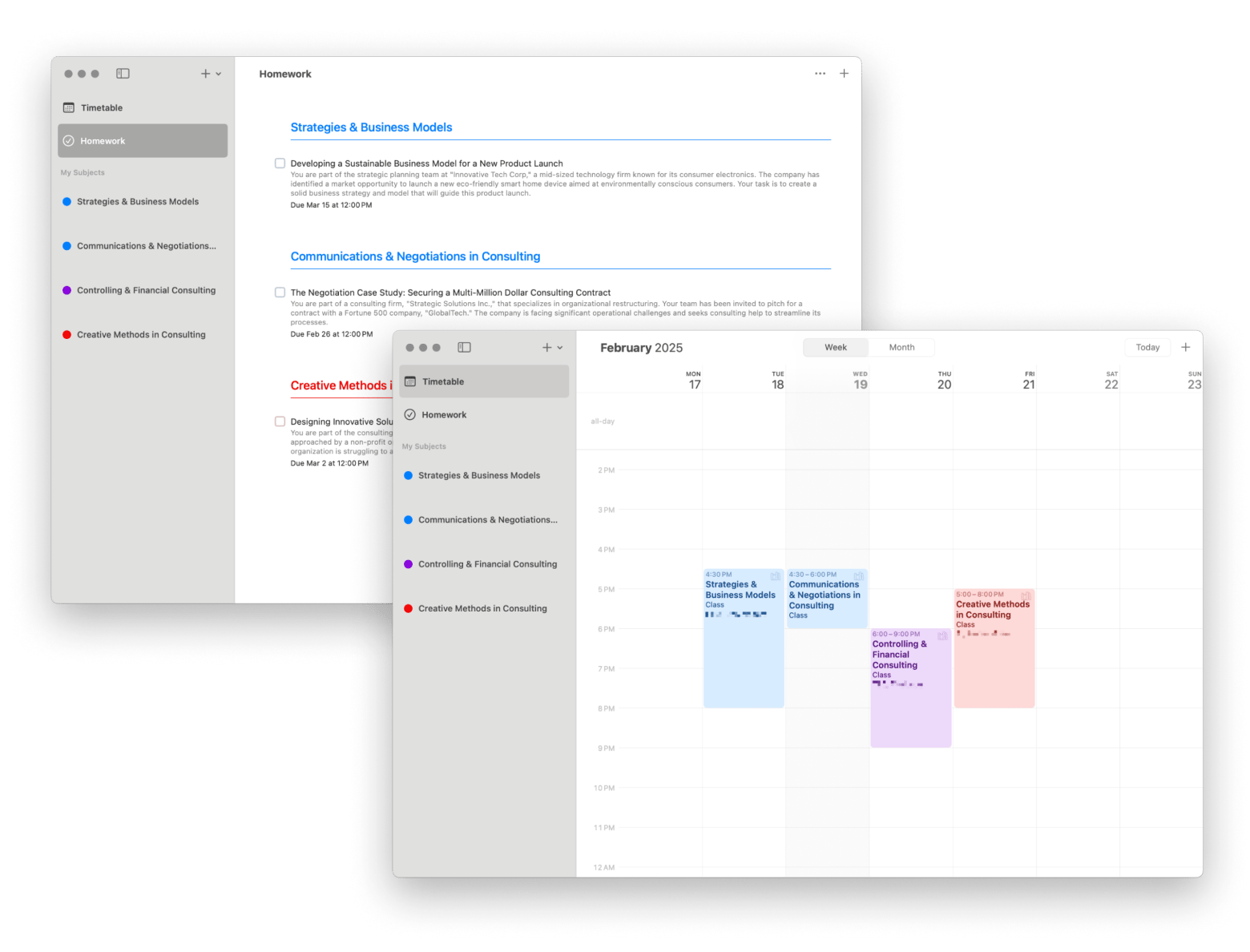
TaskHeat: Sets priorities
When you have multiple projects, prioritization is essential to avoid failure. Previously, I just wrote out a list of tasks for the week and the number of them made me anxious — I didn't know what to tackle.
TaskHeat transformed this chaos into a visual story. Looking at my tasks as colorful flowcharts instead of lists is much more fun. I color-code everything — red for urgent work deadlines, blue for MBA assignments, and green for preparation tasks. That helps me spot potential bottlenecks before they happen.
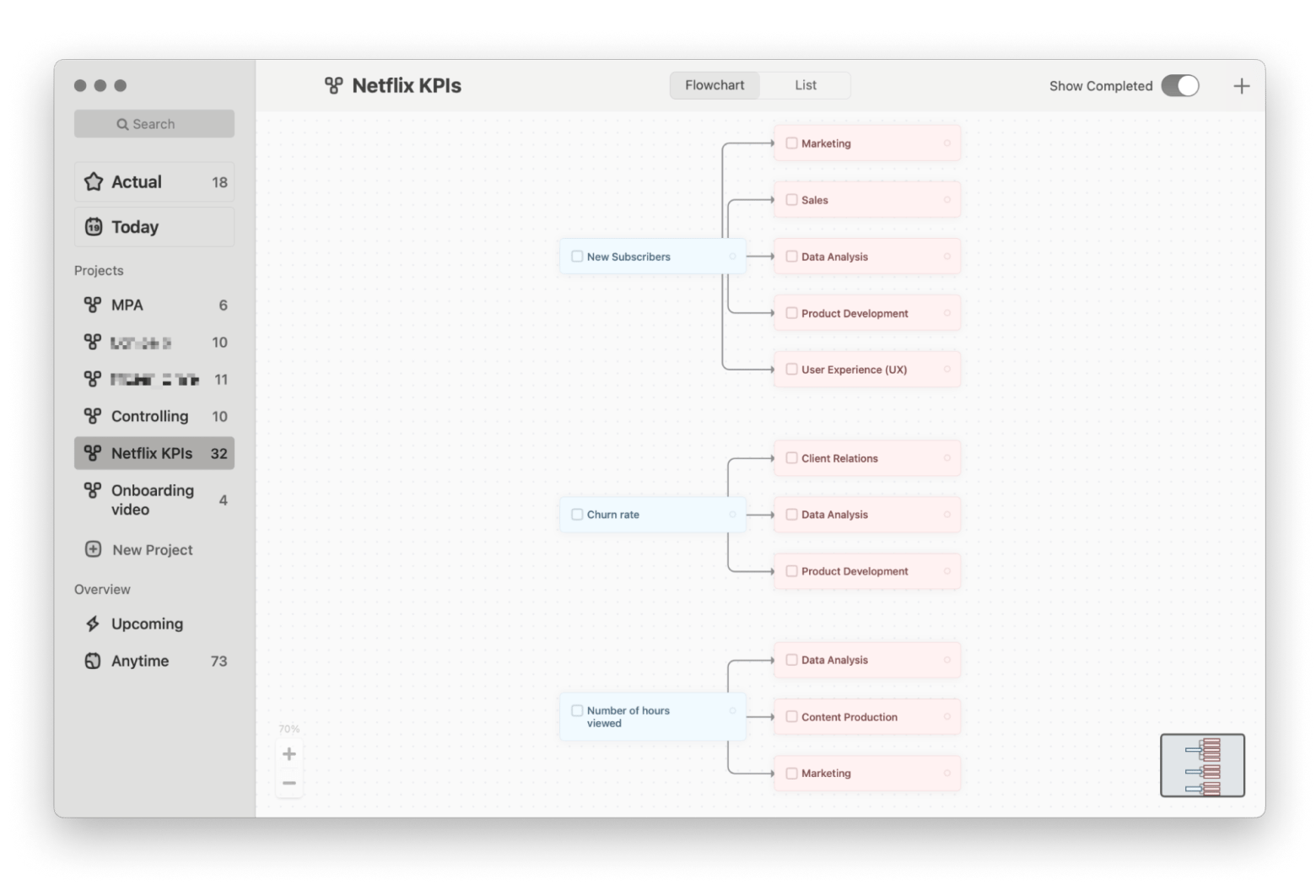
Numi: calculations guru
After getting tired of spending hours calculating in Excel, I experimented constantly with different tools. A lot of people rely on ChatGPT for calculations, but in my experience, it is not that accurate. Plus, it takes time to transfer data and explain the issue.
Another thing is Numi. Without exaggeration, it is my lifesaver and an irreplaceable companion in studies! It performs calculations simply from my notes, no matter how complicated they are. Everything stays in one place, like a conversation with a really smart math buddy.
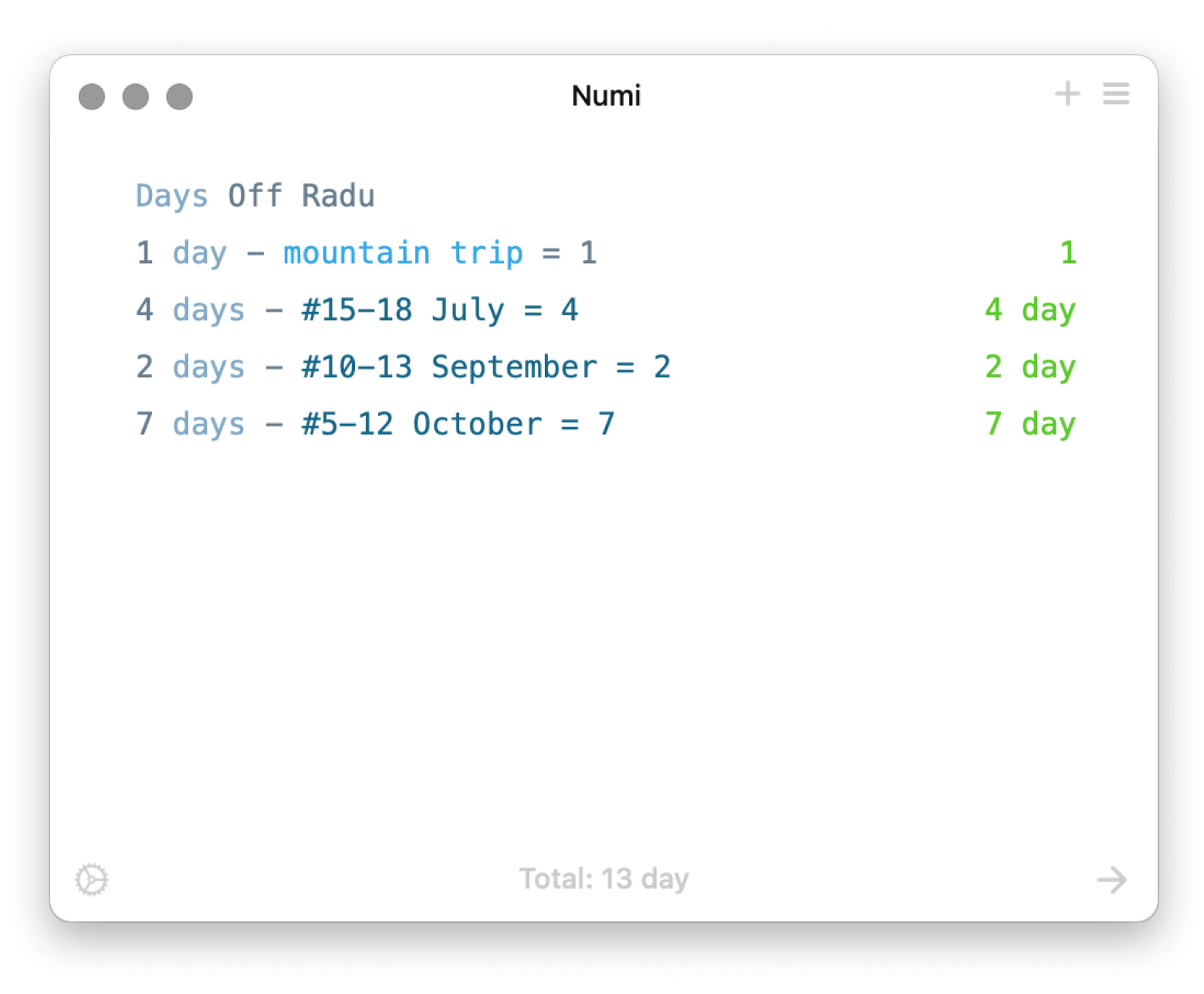
Writing, editing, and note-taking apps
MindNode: Turns thoughts into ideas
With MindNode, I can express my thoughts in various ways, including not only words, but also notes, stickers, tags, tasks, and more, using outlining and mind mapping. MindNode also offers an array of themes, stickers, and emojis, allowing me to fine-tune every detail to my preferences.
When my head is a whirlwind of chaotic thoughts, I just pour them into this app and experience that 'aha!' moment with a clear vision of the whole picture. MindMode works both on a MacBook and an iPad with seamless iCloud sync across platforms.
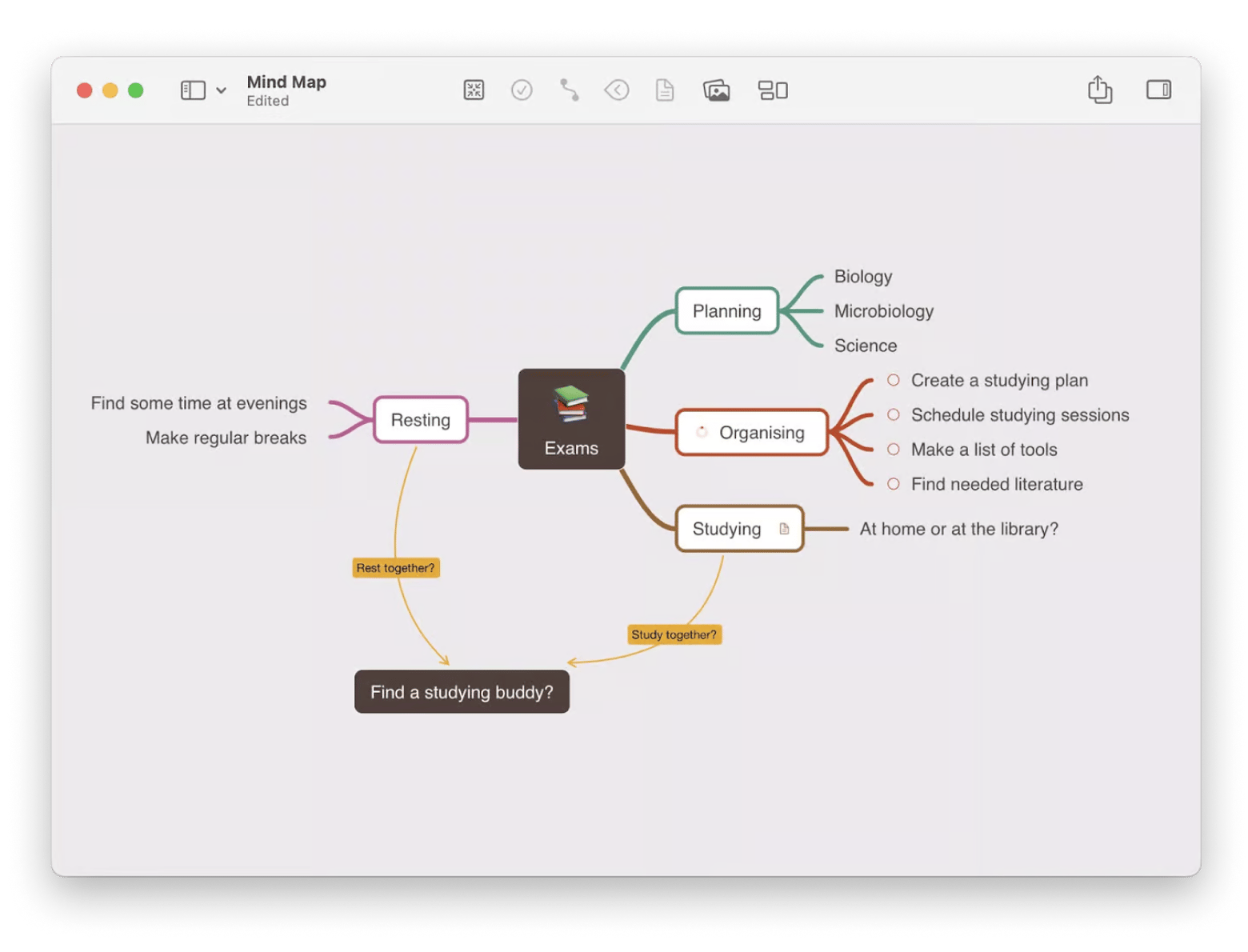
Ulysses: Keeps notes organized
As a student, I have to write a lot of assignments, and this process used to be really chaotic. My drafts were scattered everywhere — in Google Docs, Notion, Mac notes, Evernote, Microsoft Word, Goodnotes...
… Whenever I had something to write about, I would search for the right information among dozens of open tabs and get lost in the amount of data. Not only was it time-consuming, but it also exhausted me because instead of writing a paper, I was wasting effort organizing the information.
I tried Ulysses to make the writing less distractive, and it became a game-changer for me. Now, when I need to focus on my assignments, the interface transforms into a clean, distraction-free canvas or light-style template. No more notification pop-ups or cluttered toolbars — just my thoughts flowing onto the page with Markdown editor support.
Moreover, with Ulysses, all my writing is organized in one library and synced across macOS and iOS. My notes are easy to find, so I don't waste time looking.
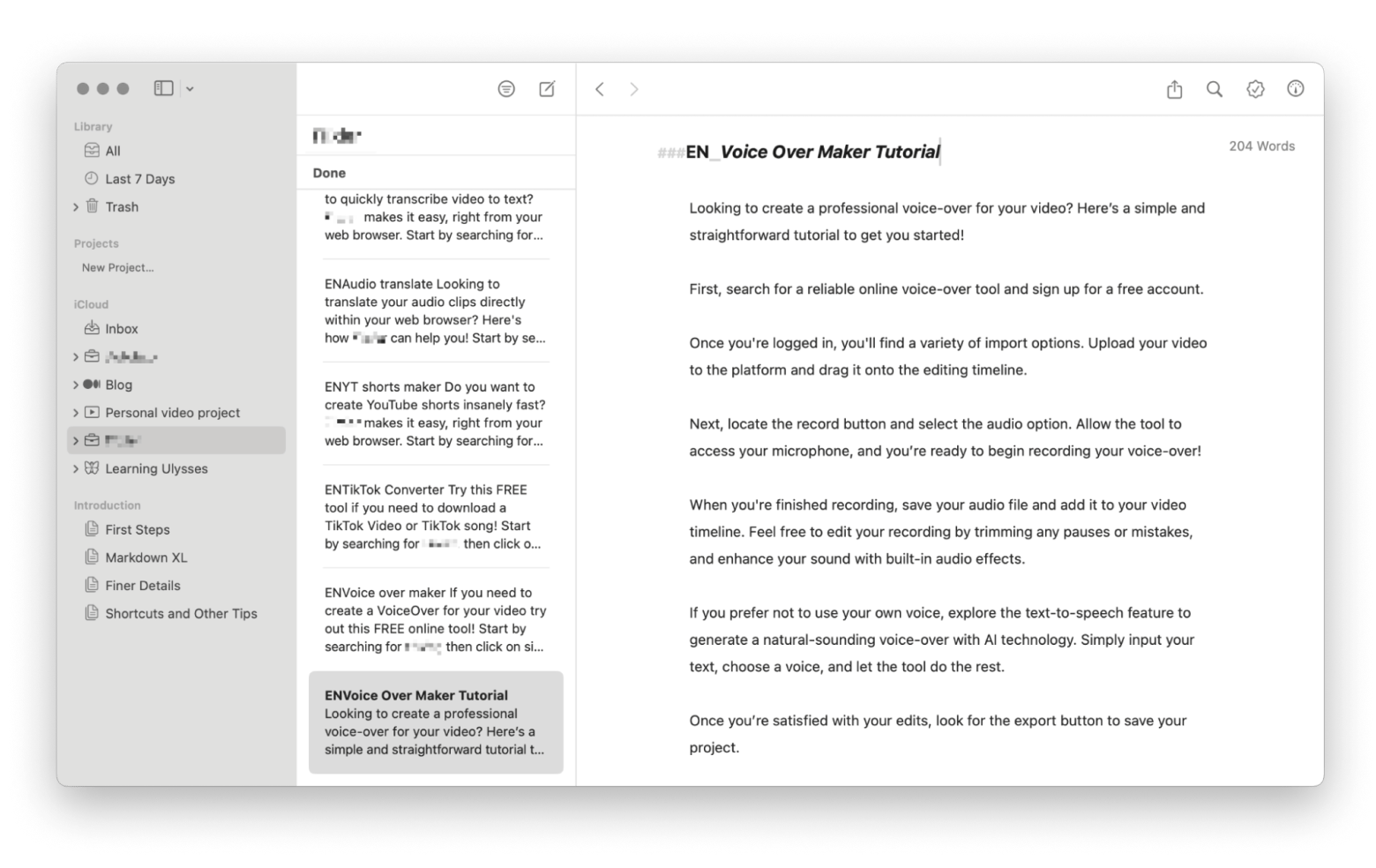
MonsterWriter: Manages academic texts easily
I rely on MonsterWriter for my classes to streamline the writing process and enhance my productivity. This app allows me to organize my notes, essays, and research effortlessly, making it easy to keep track of various assignments. One of my favorite features is the citation tool, which simplifies the often tedious task of formatting references. With MonsterWriter, I can focus more on developing my ideas and less on the technicalities of citation, ensuring my work is both well-organized and academically sound.
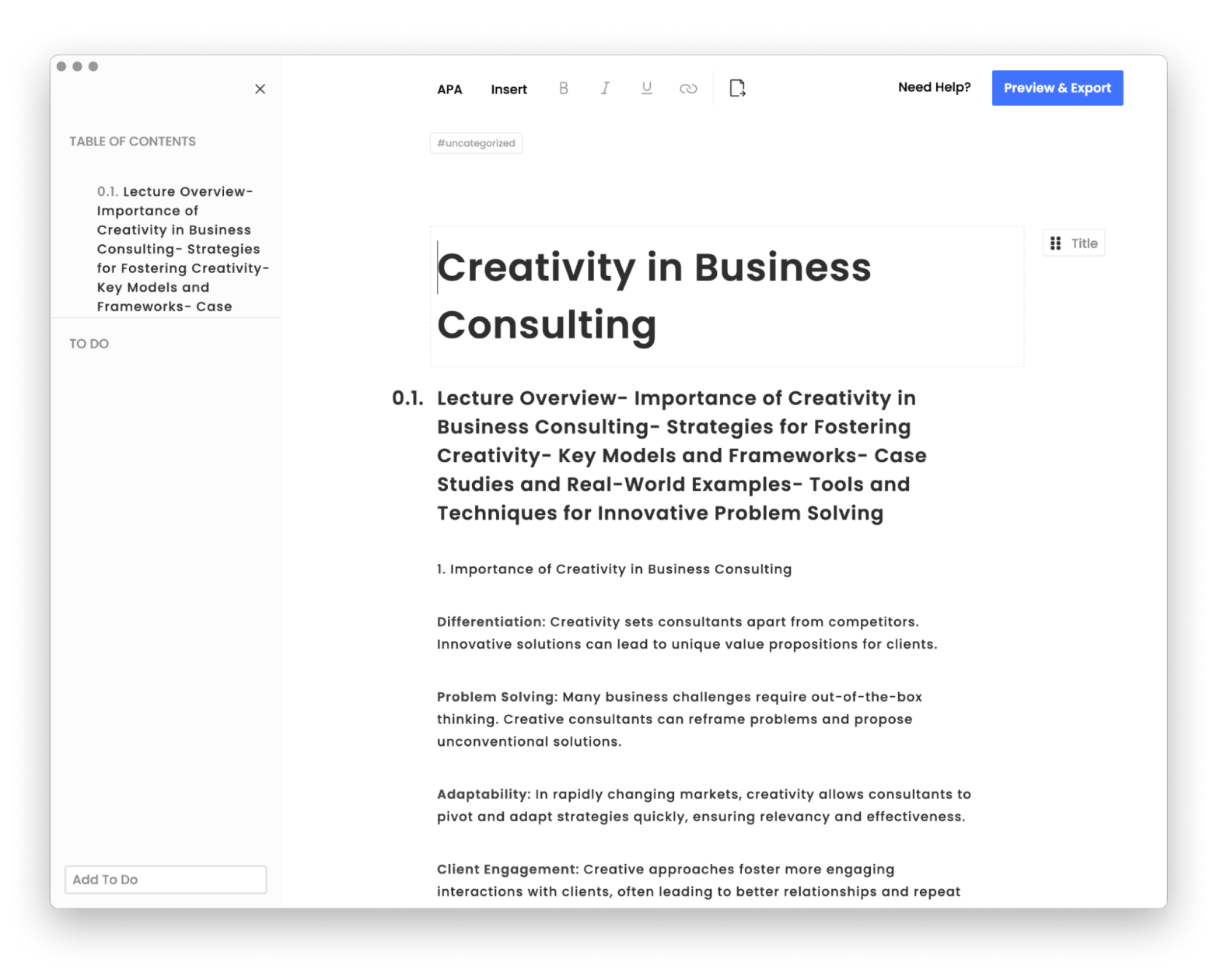
Free Essay Summarizer: Summarize any academic essay
Just drop your essay into the Essay Summarizer (a free GPT assistant), and it’ll instantly compress it into a concise version. You can extract key takeaways, generate a 100-word or one-sentence summary without the hassle. I live to use it to compare my original essay with my own summary to see how well they match. The assistant works with text pasted directly into the search field, as well as common GPT-approved file types like PDF, TXT, and images.
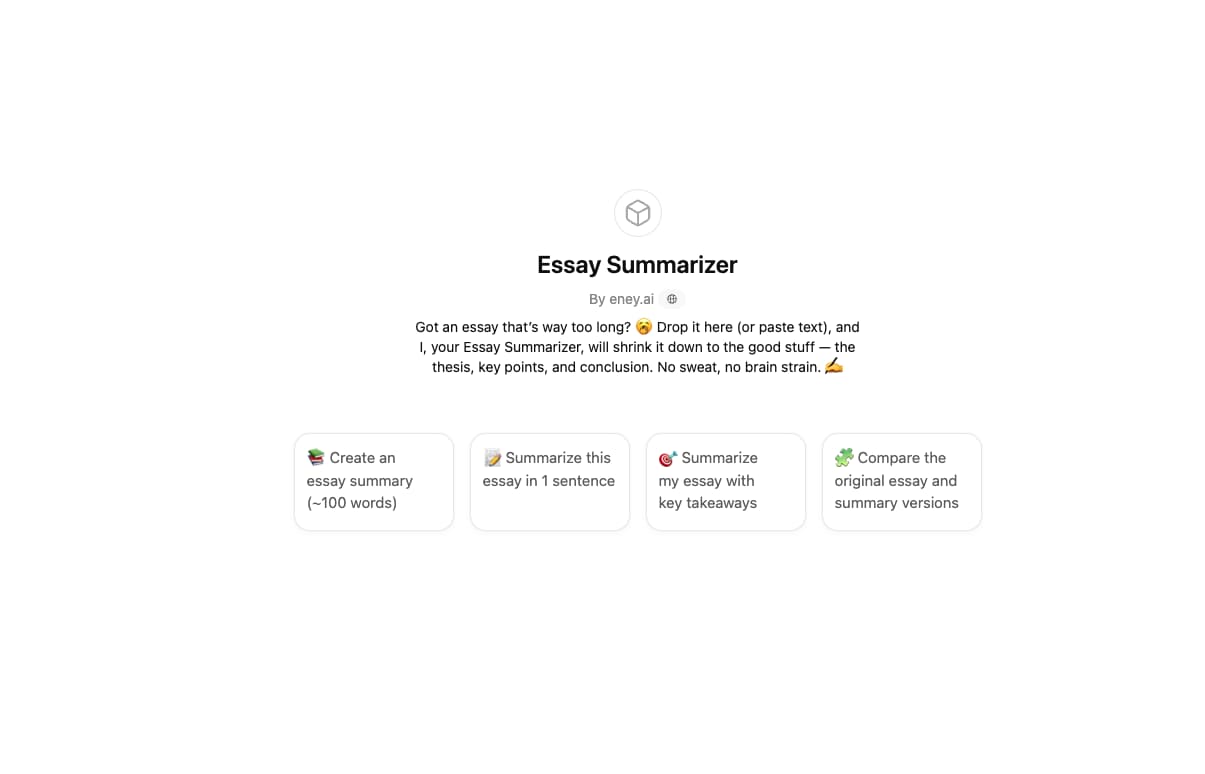
Read also:
Document management
PDF Search: Personal research assistant
I used to spend hours manually skimming through PDFs looking for specific information across dozens of academic papers.
PDF Search has completely transformed my research process. Now, when my university professor drops a 200-page case study on us, I don't break a sweat. What would have taken hours of manual searching took literally seconds — I typed in a few keywords, and then every relevant mention was highlighted across all my saved PDFs. It's like having a personal research assistant who has read and memorized every document I own. And it works on iPhone, too.
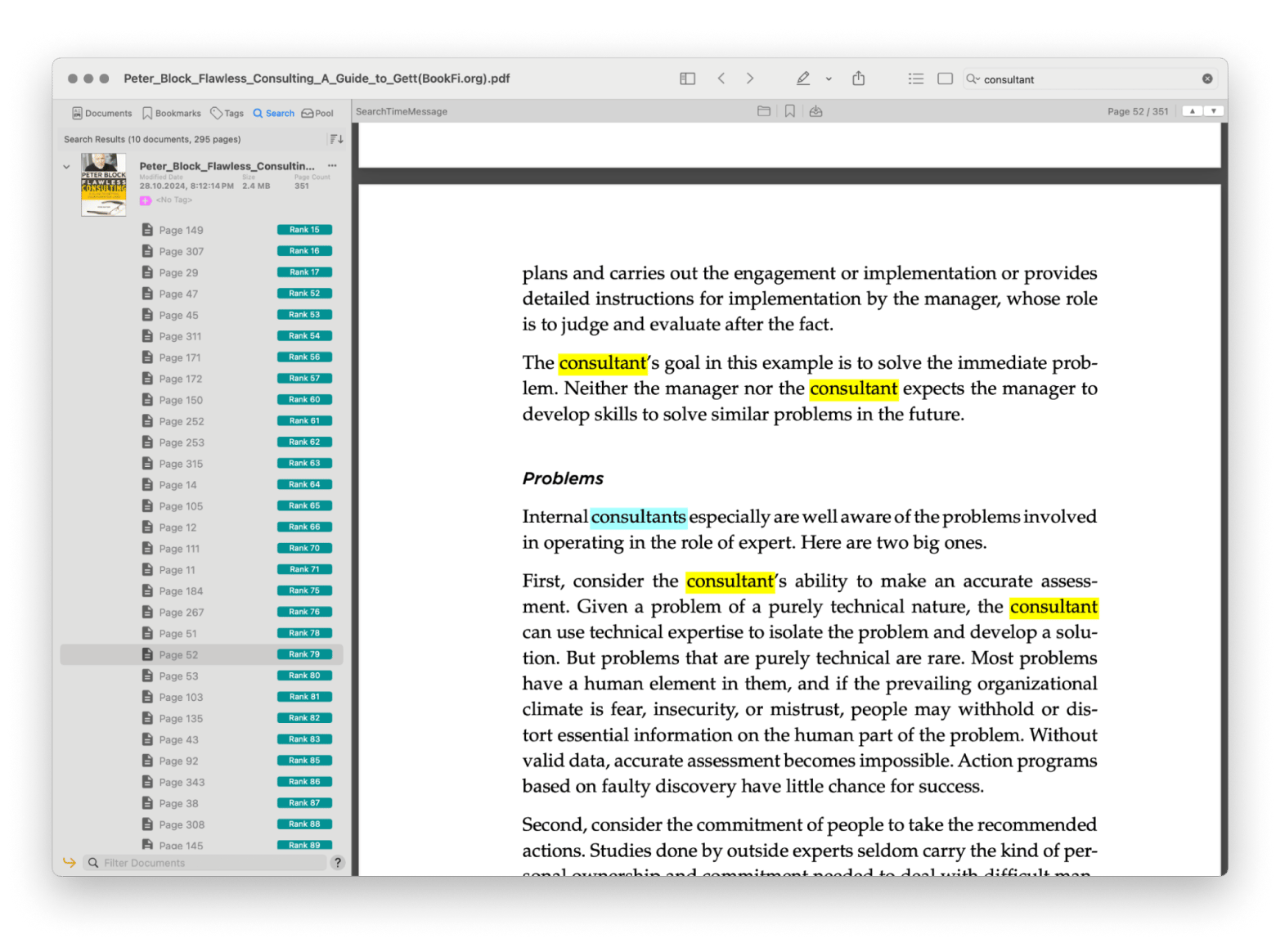
PDF Squeezer: Simple file sharing
Every student's worst dream is to see 'file size too large' on the screen when submitting the project. Especially if it is the last minute before the deadline. Project presentations can weigh up to 100 MB — the email system simply does not allow them to be sent that way.
I tested various software to optimize the file size, but they significantly reduced the quality. Then I tried PDF Squeezer and realized that it was the perfect solution. Now I can shrink files down to a manageable size without sacrificing quality
Instead of figuring out the logistics of how I'm going to send a large file — I just drag, drop, and send it.
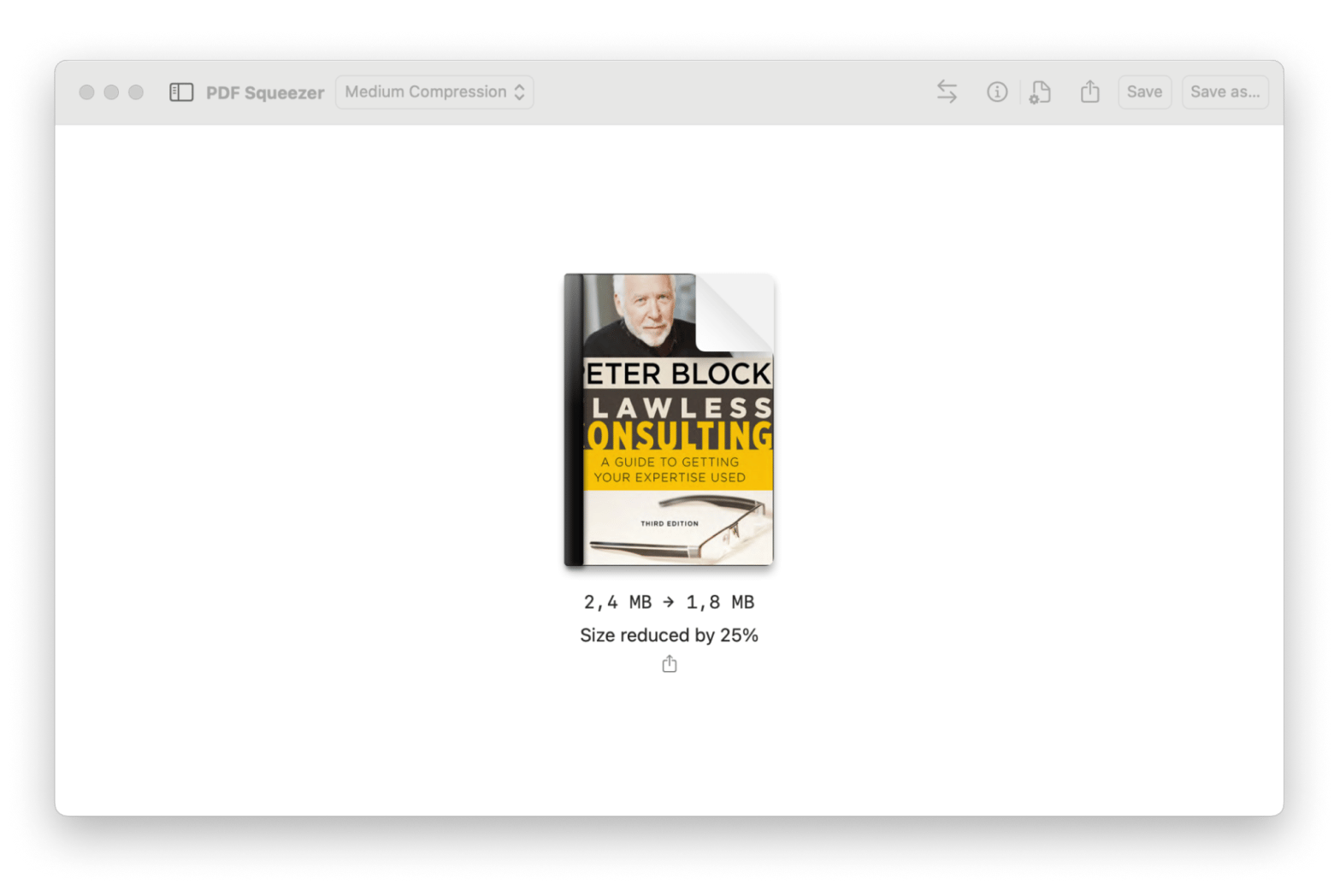
TipNot funny at all, but juggling school with a full-time (or almost full-time) job is a reality for many of us. If you’re currently job hunting, you can at least make the resume-building part easier. I beg you to try the Resume Summary Generator to save time. It’s free and doesn’t just generate a resume; for example, it helps you match your skills, experience, and background to the job description. One especially useful feature is that it scores and refines your resume to make it more appealing to potential employers. |
Final thoughts: from chaos to efficiency
With Setapp, I now organize my day in a more structured and intentional way. Each morning, I review my priorities and create a to-do list, which allows me to visualize my tasks and identify what needs immediate attention. I implement time blocking, allocating specific time slots for focused work on assignments, emails, and freelance projects. When I don’t have that much time or just want to take it slow, I try working on tasks that take less than 10 minutes to complete.
My overall productivity has increased, and time spent managing emails has been reduced by about 25%, thanks to Spark Mail. Instead of spending 2 hours checking inboxes and replying to emails across different accounts, I only spend 1.5 hours now. Moreover, I finish more tasks during the day and write research papers faster.
Overall, these changes have allowed me to balance my commitments more effectively, leading to a more manageable and less stressful daily routine.





